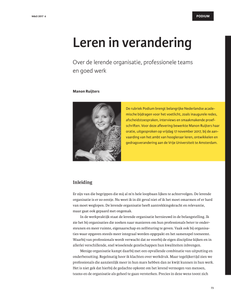De rubriek Podium brengt belangrijke Nederlandse academische bijdragen voor het voetlicht, zoals inaugurele redes, afscheidstoespraken, interviews en smaakmakende proefschriften. Voor deze aflevering bewerkte Manon Ruijters haar oratie, uitgesproken op vrijdag 17 november 2017, bij de aanvaarding van het ambt van hoogleraar leren, ontwikkelen en gedragsverandering aan de Vrije Universiteit te Amsterdam.
DOCUMENT

Aan hogescholen is de laatste decennia een nieuwe traditie ontstaan: het geven van een lectorale rede bij de aanstelling als lector. De eer dit driemaal te hebben mogen doen in de afgelopen 15 jaar is de aanleiding geweest de redes hier samen te brengen. De eerste rede uit 2008, Idola van de crossmedia, verkent het terrein van de crossmedia en het gereedschap van het praktijkgericht onderzoek aan de hogescholen. In de rede Crossmediascapes uit 2014 wordt meer precies ingegaan op wat crossmedia betekent voor de praktijk. In De Voorbeschouwing uit 2022 is de aandacht gericht op het doen van praktijkgericht onderzoek zelf, door een eigen idioom te ontwikkelen voor het streven naar, en evalueren van, impact van onderzoek dat recht doet aan het praktijkgericht onderzoek.
DOCUMENT

Oscar Guermonprez is ruim veertig jaar actief geweest in het volkshogeschoolwerk. Hij stond aan de wieg van wat we nu ‘een leven lang leren’ en ‘participatie’ noemen. Hij was cursusleider en directeur van volkshogeschool Bergen. Hij behoort tot de grondleggers van het moderne vormings-, volksontwikkelings- en trainingswerk, cultuureducatie, democratische burgerschapsvorming en het stimuleren van burgerinitiatief
DOCUMENT

Copyright enforcement by private third parties – does it work uniformly across the EU? Since the inception of Napster, home copying of digital files has taken a flight. The first providers of software or infrastructure for the illegal exchange of files were held contributory or vicariously liable for copyright infringement. In response, they quickly diluted the chain of liability to such an extent that neither the software producers, nor the service providers could be held liable. Moving further down the communication chain, the rights holders are now requiring Internet Service Providers (ISPs) that provide access to end customers to help them with the enforcement of their rights. This article discusses case-law regarding the enforcement of copyright by Internet Access Providers throughout Europe. At first glance, copyright enforcement has been harmonised by means of a number of directives, and article 8(3) of the Copyright Directive (2001/29/EC) regulates that EU Member States must ensure the position of rights holders with regard to injunctions against ISPs. Problem solved? Case law from Denmark, Ireland, Belgium, Norway, England, The Netherlands, Austria and the Court of Justice of the EU was studied. In addition, the legal practice in Germany was examined. The period of time covered by case law is from 2003 to 2013, the case law gives insight into the differences that still exist after the implementation of the directive.
DOCUMENT

De wereld verandert snel. Hoe moeten wij ons op de toekomst voorbereiden? Dat begint met een goed begrip van hoe de wereld feitelijk in elkaar zit, wat de drijvende krachten zijn, hoe machtspolitiek van de grote mogendheden op andere landen inwerkt en aan welke eisen van volkenrecht en politieke ethiek goed beleid hoort te voldoen. Ook de werking van de mondiale economie en van internationale organisaties als de VN, de NAVO en de EU is erg belangrijk. Dit studieboek geeft een inleiding in de leer van de internationale betrekkingen. Deskundigen leggen helder uit hoe de huidige politieke wereld is ontstaan, wat er op de agenda van het buitenlands beleid staat, en in welke richting de mondiale problematiek zich ontwikkelt. Wat is het risico op nieuwe oorlogen? Zou de Europese Unie uiteen kunnen vallen? Waarom is er ontwikkelingssamenwerking? Hoe op te treden tegen agressie en schendingen van het volkenrecht en de rechten van de mens? Hoe kunnen kleine, maar welvarende en moderne landen als Nederland en België zich staande houden en voor een veilige toekomst helpen zorgen? Horen we vooral het nationale belang te behartigen of moeten we ons als echte wereldburgers opstellen? Hoe is er opbouwende invloed uit te oefenen, als burger, kiezer, politicus, belangenbehartiger of activist voor goede doelen? Dat zijn relevante vragen die steeds opnieuw, kritisch nadenkend, moeten worden beantwoord om betere resultaten te boeken. Wereld in Beweging is een handreiking daarvoor. Dit is de 2de druk van deze publicatie. De 3de druk is in 2021 verschenen: https://www.boomdenhaag.nl/webshop/wereld-in-beweging-2
MULTIFILE

MULTIFILE
